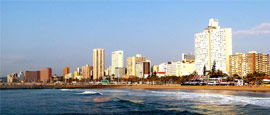Durban History
Hitherto thought to be a relatively modern spot, the recent discovery of Neolithic remains close to the Drakensberg Mountains has revealed that Durban dates back to 100,000 BC.
But while the early hunter-gatherers left traces in the form of rock art, written history doesn’t begin until 1497 and the arrival of Portuguese explorer Vasco da Gama. He named the area Natal, meaning Christmas in Portuguese
The modern city of Durban dates from 1824, when a party of Britons arrived under Lieutenant F. G. Farewell and established a settlement. Thanks to a companion called Henry Francis Fynn, who befriended the Zulu King Shaka, Fynn was granted a ‘30-mile strip of coast a hundred miles in depth’. The ensuing city was named d’Urban, after Sir Benjamin d'Urban, then governor of the Cape Colony.
To begin with, the citizens numbered just a few dozen European settlers, but with the establishment of the Voortrekker republic of Natalia in 1838, the British felt threatened and brought in a garrison to protect them. Disputes between British and Afrikaaner settlers over the treatment of Zulus led to a British conquest in 1844. The British established a sugar cane industry in the 1860s and brought thousands of indentured labourers from India to work on the plantations. Many stayed on to establish businesses, swelling the city’s population further.
The development of the railways and harbour improvements came alongside the expansion of the sugar cane industry, which enabled larger cargo ships and liners to dock at the city. Eventually, it became an important port and the largest sugar terminal in the world.
Following the Boer Wars and the creation of the Union of South Africa by the British, segregationist legislation was passed, heralding the arrival of apartheid. Introduced by the Afrikaaner National Party in 1948, it continued until the 1990s. In Durban, even the beaches were segregated.
The end of apartheid brought a new lease of life for Durban, which has since undergone extensive regeneration. As a result, it is now the third richest city in South Africa and remains one of its most interestingly eclectic.
Did you know?
• Durban is named after Sir Benjamin d'Urban, the governor of the Cape Colony when the city was begun.
• The Durban July Handicap is one of the world’s oldest horse races. It first took place in 1897.
• In ‘Black December’, which actually lasted from December 1957 to April 1958, the city suffered a record five fatal shark attacks in just 107 days.
Do you have any Feedback about this page?
© 2026 Columbus Travel Media Ltd. All rights reserved. No part of this site may be reproduced without our written permission, click here for information on Columbus Content Solutions.




 You know where
You know where